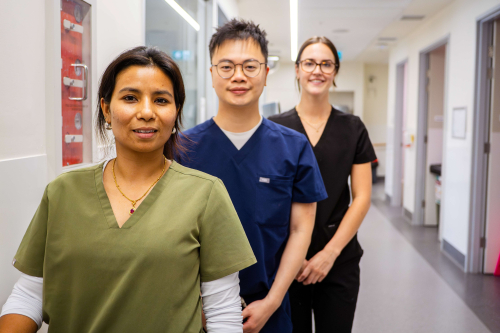‘Bug fights’: improving infection prevention in the Pacific

The Alfred recently welcomed guests from Port Moresby General Hospital in Papua New Guinea, as a part of novel program designed to assist hospitals in the Pacific Islands to improve their infection prevention response.
The visit came about through the ongoing partnership between The Alfred’s Department of Infectious Diseases and a program funded by the Department of Foreign Affairs and Trade (DFAT) and led by the Burnet Institute and Doherty Institute, known as COMBAT-AMR.
COMBAT-AMR, which began in 2019, is all about building capacity of hospitals in the region to better identify and manage antimicrobial resistant infections, said Director of Infection Prevention A/Prof Andrew Stewardson.
“In particular it's focusing on infection prevention, antimicrobial stewardship, laboratory capacity and animal health,” A/Prof Stewardson said. “We're mainly providing technical expertise to contribute to the infection prevention work, to antimicrobial stewardship and also to lab capacity.”

While treatment resistant infections are not necessarily a new phenomenon, suggests The Alfred’s Head of Microbiology Dr Adam Jenney, the threat posed by rising rates of antimicrobial resistant infections is nonetheless a massive problem particularly in low- and middle-income nations with limited resources for the surveillance of antimicrobial resistant infections.
“As often happens in resource strapped regions, surveillance is not something that they can dedicate a lot of resources towards,” Dr Jenney said. “Instead, they have to put all their money and resources into treating people.”
“Part of the role of COMBAT-AMR is to help fill that knowledge gap to know the scale of the problem.”
With a recent study led by researchers at the University of Sydney finding “alarmingly high rates” of antimicrobial resistant infections already among infants and young children in the Asia Pacific region, increasing the surveillance capacities of hospitals in the Pacific forms only one part of responding to the issue, adds A/Prof Trisha Peel.
“Something else that we've been working on is looking at laboratory techniques and technologies, but also the personnel capacity to be able to use those technologies,” A/Prof Peel said. “It’s about trying to look at what we do here, then what they have available to them over in Pacific Island countries like PNG, and working with those clinicians to try and come up with solutions that are fit for the resources and capacity available.”
Hospitals in the region such as Port Moresby General Hospital – the largest in Papua New Guinea with a total of 1,200 beds – can particularly struggle due to the challenges of limited resources in the face of high demand for care.

Sister Josephine Telenge, one of the recent guests to The Alfred and one of only two dedicated infection prevention staff at Port Moresby General Hospital, admits having such limited resources can be very challenging.
“Often we are running all over the place,” Sr Telenge said. “It can be really overwhelming.”
“The challenges are large,” agrees A/Prof Stewardson. “But there are also big gains to be made with relatively minimal changes, and it's just a matter of trying not to implement everything at once.”
Despite the challenges, the passion and commitment of health professionals like Sister Telenge and others alongside her at Port Moresby General Hospital act as driving forces in the efforts to build capacities for infection prevention in the Pacific region.
Clinical Microbiologist Dr Gabriella Ak – a guest to The Alfred thanks in part to the support of the DFAT Australia Awards Fellowship Program – has played a particularly pivotal role in assisting to build the capacity of infection prevention at Port Moresby General.

Helping to establish the hospital’s Infection Prevention and Control (IPC) Committee, Dr Ak soon engaged The Alfred’s A/Prof Stewardson and the COMBAT-AMR team, speaking highly of the positive impact the collaboration has already had on improving infection prevention strategy at Port Moresby General Hospital.
“I think the fact that we have a bit more knowledge now helps us to be able to move the ship and sort things out,” Dr Ak said.
For his part, A/Prof Stewardson speaks equally glowingly of his colleagues from the Port Moresby General Hospital and the work of the COMBAT-AMR program.
“It’s really been an amazing opportunity,” A/Prof Stewardson said. “I’ve felt fortunate to be in the position to be able to be involved in this project.
“And I would emphasise that there's information flowing in two directions and capacity building flowing in in two directions.”
“We've been able to bring some technical expertise to apply to specific areas in Port Moresby, but their local infection prevention team also brings to us an amazing example of how to initiate change and the impact that individuals can have. So that's been a really great experience to be part of.”

_500_333.jpg)

